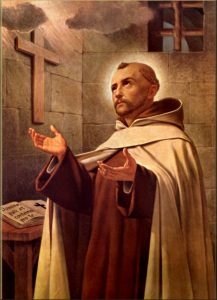HOMILY ADVENT WEEK 03 01 – Year II
Responding to Prophecy with Authority:
Memorial of St. John of the Cross
(Num 24:2-27; Ps 25; Mt 21:23-27)
*********************************************
How much authority do you exercise?
Today’s readings invite us to speak out with faith and exercise our authority as baptized believers in Jesus.
In the first reading from Numbers, the prophet Balaam twice asserts his authority to speak on God’s behalf, and finally, comes out with a striking prophecy – “A star shall come out of Jacob, and a sceptre shall rise out of Israel.”
In the gospel, we have the sharply ironic scene of Jesus, whom we believe is the fulfillment of that prophecy by Balaam, precisely that star and sceptre in person, confronted by the religious leaders of Israel who don’t believe in him, who are resisting him and here, question his authority: “By what authority are you doing these things? And who gave you this authority?” Jesus very cleverly presents a counter-question to them, which they can’t answer without revealing their true intent – to trap him.
According to Bishop Robert Barron, the Greek word used for “authority” is most enlightening: exousia. It means, literally, “from the being of.” Jesus speaks with the very exousia of God, and therefore, his words effect what they say. He says, “Lazarus, come out!” and the dead man comes out of the tomb. He rebukes the wind and says to the sea, “Be still!” and there is calm. And the night before he dies, he takes bread and says, “This is my body.” And what he says is.
This is the authority of the Church. If we are simply the guardians of one interesting philosophical perspective among many, then we are powerless. If we rely on our own cleverness in argumentation, then we will fail. Our power comes—and this remains a great mystery—only when we speak with the authority of Jesus Christ.
Part of that authority will flow when we respond to Balaam’s prophecy with the attitude of the psalmist today: “Teach me your ways, O Lord.” The psalm goes on to describe that way of the Lord as one of mercy, steadfast love and humility. When we are open to hearing God’s truth, that God is first and foremost humble steadfast love and mercy, and strive to live that way in our lives, we will be able to speak with authority – our very presence will exude it through our peace and joy that comes from doing the will of God.
Another meaning for authority can be to “author life.” That is our call as well, to bless others, to love them, to affirm them, to see their God-given potential and draw it out by affirming them.
Another shade of meaning in that word exousia is that it is the power of a little child, whose innocence and powerlessness can melt the hardest heart. That is the power, the authority God chose to use in sending Jesus among us as a little child, who to show us the depth of God’s love for humanity, gave his life for us totally powerless on the cross, yet in that very action, demonstrating that exousia is the greatest power of all, leading to resurrection and the defeat of even death.
Members of the L’Arche movement exercise this kind of authority daily. Their role at l’Arche, and of all those who are close to people with intellectual disabilities, is to help them to discover that their life has meaning, that the community, the Church, society needs them and that they have a special capacity to touch hearts and to give life.

St John of the Cross
Today the church honors St. John of the Cross, who was born in 1542 at Fontiveros, Spain. He entered the Carmelite community and was ordained in 1567. With the great Carmelite mystic, Teresa of Avila, he worked for the reformation of his order, and helped found the reformed (‘Discalced’) Carmelites. During his life, he suffered much, enduring imprisonment, humiliation and ill-treatment. His writings are both classics of spiritualty and of Spanish literature. His best-known works are The Ascent of Mount Carmel, The Dark Night of the Soul, and The Living Flame of Love. He died in 1591, was canonized in 1726 and proclaimed a Doctor of the Church in 1926.
The Eucharist is itself a living out of this authority of God in Jesus – this exousia of humble, merciful steadfast love experienced by us through word and especially through humble gifts of bread and wine transformed into the body and blood of Jesus.
May our celebration strengthen our faith in Jesus as Son of God, Lord, Savior, Messiah, and empower us to share that faith and love with others with the very exousia of God.



